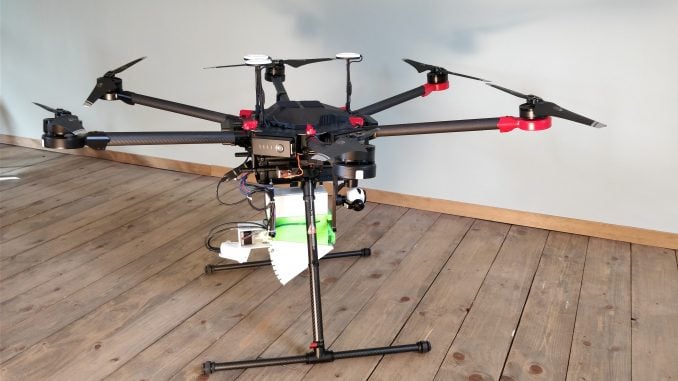
WASHINGTON/RALEIGH – The federal Department of Transportation recently named N.C. one of only ten participants in the fed’s Unmanned Aircraft System Integration Pilot Program, aimed at finding the best way to integrate drones into U.S. airspace safely. The initiative was created by President Donald Trump last year as part of an effort to address growth and potential in the burgeoning drone industry.
In N.C. the department will be working with global drone deliver companies to set up a network of drones to make drops of medical supplies. Currently, couriers deliver blood and test results, but advocates of the project say drones would be faster. But transporting medical materials would take some serious study, says the DOT.
“The FAA is relying on states and municipalities to provide them data to help feed their rule-making,” said Basil Yap, N.C. Division of Aviation UAS program manager. “The operations we are going to focus on are not currently allowed, and in order for them to be allowed they need data to help with those decisions.”
Apple Inc’s is a partner in N.C.’s project proposal, with plans to photograph North Carolina topography by drone, PrecisionHawk of N.C. creates software to guide drones and will also be working on the N.C. project. Supporters say that delivering medical supplies by drone could cut critical wait time in a medical crisis.
Among the projects seleted by the USDOT are a 1,500-pound, unmanned aircraft that will look for mosquitoes in Florida; and startup Flirtey will fly medical equipment on drones to heart-attack victims in Nevada. Microchip maker Intel Corp, plane maker Airbus SE, ride services company Uber Technologies Inc, delivery company FedEx Corp and software maker Microsoft Corp also had projects on the winners list.
Missing from the projects are Amazon.com Inc, the world’s largest online retailer, and China’s DJI, the world’s largest maker of non-military drones. About a dozen applications that included DJI were rejected. An application that would have seen Amazon deliver goods by drone to shoppers in New York City was also declined, a person familiar with the matter said.
The contest drew 149 bids from locales looking to host flights at night, flights over people and other drone operations that U.S. rules prohibit. The applicants listed companies they would partner with in the experiments, and the winners may have a head start at the billions of dollars and tens of thousands of jobs the young industry expects to create.
U.S. Transportation Secretary Elaine Chao said dozens more projects could be approved in coming months, either with new waivers or under existing rules. The wide interest in the U.S. initiative underscores the desire of a broad range of companies to have a say in how the fledgling industry is regulated and ultimately win authority to operate drones for purposes ranging from package delivery to crop inspection.
AirMap, an airspace management company for drones, said it was on six winning applications.
Winner Virginia Tech said that Alphabet’s Project Wing , AT&T Inc, Intel, Airbus and Dominion Energy Inc are among the partners for its pilot program that will explore emergency management, package delivery and infrastructure inspection.
Uber is working on air-taxi technology and will deliver food by drone in San Diego, California.
“We need flying burgers,” Chief Executive Officer Dara Khosrowshahi joked at a conference.
FedEx will use drones to inspect aircraft at its hub in Tennessee, as well as for aircraft parts shipments and some package deliveries between the airport and other Memphis locations, Memphis Airport Authority Chief Executive Scott Brockman told Reuters. General Electric Co is also a partner, he said.
The USDOT is also working on whether regulations are necessary as drones become more accessible and affordable. The FAA has said regulations are necessary to protect the public and the National Airspace System from bad actors or errant hobbyists. Several incidents around major airports have involved drones getting close to aircraft.
Earlier, the agency confirmed it had sent two planned rules to the White House to regulate the increased use of unmanned aerial vehicles.
One would allow drones to fly over people while another proposal submitted would allow for remote identification and tracking of unmanned aircraft in flight. After both are formally proposed, it could take months before they are finalized.
Reuters News Service contributed to this report.


